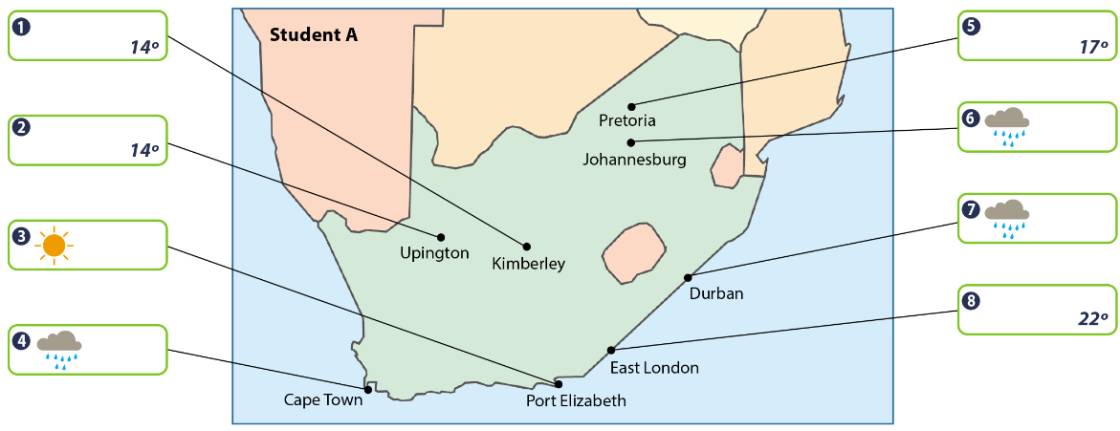What’s the weather like in South Africa tomorrow. Student A: Look at the weather map below. Student B: Turn to page 136. Ask and answer questions to complete the temperatures and weather conditions on your map.

Hãy nhập câu hỏi của bạn vào đây, nếu là tài khoản VIP, bạn sẽ được ưu tiên trả lời.

Difference in two pictures
Picture in page 95 | Picture in page 136 |
- Maria and Anna are talking - Nathan and David are using computer - Julie is talking con the phone - Manuela is playing tablet | - Manuela and Julie are talking - Nathan and Anna are using computer - David is talking on the phone - Maria is playing tablet |
Hướng dẫn dịch
Sự khác nhau giữa hai bức tranh
Bức tranh ở tranh 95 | Bức tranh ở tranh 136 |
- Maria và Anna đang nói chuyện với nhau - Nathan và David đang sử dụng máy tính -Julie đang nói chuyện điện thoại - Manuela đang chơi máy tính bảng | - Manuela and Julie đang nói chuyện với nhau - Nathan và Anna đang sử dụng máy tính - David đang nói chuyện điện thoại - Maria đang chơi máy tính bảng |

How do I get to the mall?
Go down straight North road and turn left on 3rd Avenue. It is on your left.
How do I get to histoy museum?
Go down straight North road and turn left on 4th Avenue. It is on your left and next to Art museum.
How can I get to pizza restaurant?
Go down straight North road and turn left on 4th Avenue. Then, turn left on Bay Road. It is on your right
Hướng dẫn dịch
Làm cách nào để đến trung tâm mua sắm?
Đi thẳng xuống đường Bắc và rẽ trái trên Đại lộ 3. Nó ở bên trái của bạn.
Làm cách nào để đến bảo tàng lịch sử?
Đi thẳng xuống đường Bắc và rẽ trái trên Đại lộ 4. Nó ở bên trái của bạn và bên cạnh bảo tàng nghệ thuật.
Làm thế nào đến nhà hàng pizza?
Đi thẳng xuống đường Bắc và rẽ trái trên Đại lộ 4. Sau đó, rẽ trái trên Đường Bay. Nó ở bên phải của bạn

Time | Kind of movie | Name of movie | Review |
yesterday moring last night this morning this afternoon | animated action comedy science fiction | The Crazy Cats Sundown Riders Dr. Disaster Space Hero | funny great fantastic exciting |
Tạm dịch:
Thời điểm | Thể loại phim | Tên phim | Nhận xét |
sáng hôm qua tối hôm qua sáng nay chiều nay | hoạt hình hành động hài kịch khoa học viễn tưởng | The Crazy Cats Sundown Riders Dr. Disaster Space Hero | hài hước tuyệt vời xuất sắc thú vị |

A: What does Trash Hero World do?
(Trash Hero World làm gì?)
B: They plan cleanups and help recycle trash.
(Họ lên kế hoạch dọn dẹp và giúp tái chế rác.)
A: Where do they work?
(Họ làm việc ở đâu?)
B: They work in Southeast Asia, Australia, Europe.
(Họ làm việc ở Đông Nam Á, Úc, Châu Âu.)
A: How can I help?
(Tôi có thể giúp bằng cách nào?)
B: You can donate money and start a cleanup.
(Bạn có thể quyên góp tiền và bắt đầu dọn dẹp.)

Đáp án B
Kiến thức: đọc hiểu
Tạm dịch: Người dự báo thời tiết phải chuẩn bị tư liệu tốt vì _____.
A. dự báo có thể được kết hợp vào việc phát sóng tin tức
B. đôi khi họ cần phải thay đổi nó để đáp ứng các giới hạn về thời gian
C. buổi phát sóng được ghi âm trước
D. họ không tự làm bản tin
Thông tin: The weather forecaster doesn't always know how much time is available, which means that he/she has to be thoroughly prepared so that the material can be adapted to the time available.
1. windy-16°
5. stormy-12°
2. windy-14 °
6.rainy-22°
3. sunny-16°
7.rainy-22°
4. rainy-16°
8.rainy-22°